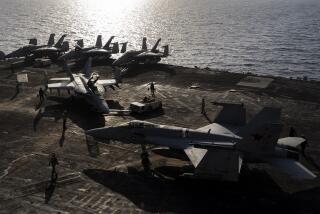Murphy Says U.S. Ships Will Stay in Gulf ‘as Long as Needed’
- Share via
WASHINGTON — U.S. Navy warships in the Persian Gulf “will stay in place as long as they are needed,” Richard W. Murphy, assistant secretary of state for Near Eastern and South Asian affairs, said Sunday.
Interviewed on NBC’s “Meet the Press,” Murphy linked any scaling down of the U.S. military presence to the end of the seven-year Iran-Iraq War.
“Our presence will remain there as long as it is needed,” he said. “ . . . I don’t think it is open-ended because I don’t think the war is going to go on all that long.” He cited “a tremendous loss of life on both sides” in the war and said “there is a limit.”
Murphy said that he hopes Iran will accept a cease-fire order voted unanimously by the U.N. Security Council. He avoided a prediction, but voiced hope that Mohammed Jawad Larijani, Iran’s deputy foreign minister, will “signify very clearly” Iran’s acceptance of the Security Council’s call for a cease-fire in the gulf war when he meets today with U.N Secretary General Javier Perez de Cuellar.
Larijani, appearing later on the same program, said Iran would “cooperate fully with any effort which aims at bringing peace to the region.” But he called the Security Council resolution “very unfortunate” because, he maintained, the United States and Iraq have violated “the letter and spirit of the resolution.” The Iraqis, he said, have escalated attacks and the United States has moved a “huge armada” into the Persian Gulf, making the situation “very volatile.”
Asked if he had any reason to believe Larijani would accept the cease-fire proposal, Murphy replied: “There have been contradictory signals out of Tehran, particularly over these last couple of weeks, some more flexible-sounding statements, more interested in a solution, than we have heard from the beginning of the war.”
Murphy acknowledged “a significant rise” in the number of U.S. warships, now logged at 41 vessels, committed to operations in and near the gulf since President Reagan ordered Navy escorts for Kuwaiti oil tankers re-registered under the American flag. The increase was caused, he said, by “a change in the nature of the threat.”
With the discovery of a number of mines in gulf waters in the past month there was “a rethinking on the part of the Navy and on the part of the Administration on what resources will be needed,” he said. “Those resources are coming into place. They will stay in place as long as they are needed.”
Murphy said the United States is “very satisfied with the support that is coming from the gulf states. . . . It is growing.” Larijani, however, called such cooperation “a very dangerous step” which “will expand the conflict beyond its existing limit.”
There were published reports during the weekend that Saudi Arabia had granted landing rights to U.S. military aircraft, but the Saudis denied the reports. The denial, Murphy said, should be taken only as an indication that “none of these states want to discuss . . . the nature of the cooperation that they are having with the United States” because Iran “plays the role of intimidation against these states.”
Murphy was asked: “These countries (in the gulf) have told you they will let you do things, but if it comes out in public they will deny it--is that right?”
“That is your conclusion, and I think it is a sound one,” Murphy replied.
More to Read
Sign up for Essential California
The most important California stories and recommendations in your inbox every morning.
You may occasionally receive promotional content from the Los Angeles Times.













